Another feat on staff capacity development was recorded in the University recently, as Provosts of Colleges, Deans of Faculties, Directors of Academic and Service Units, Heads of Departments which partly constitute the expanded Management of University Administration were treated to a 3-day Capacity Building Workshop for the Middle and Senior Managers. The training programme, which had as its theme: Essential Leadership and Management Skills for New Middle and Senior Level University Managers was a beehives of Crème-de-la-crème and experts in Capacity Building industry. They included distinguished University administrators, Human Resource Consultants etc, who effectively handled different training sessions centred on relevant topical issues at the event held between Thursday, 26th and Sunday, 29th September, 2019, at Equity Resort Hotel, Ijebu-Ode.
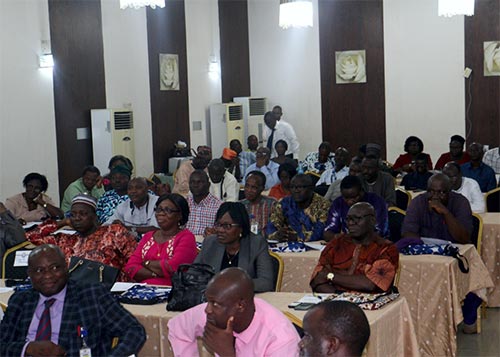
Declaring the programme open, the Vice-Chancellor, Prof. Ganiyu Olatunji Olatunde who reiterated his administration’s commitment towards excellence in service delivery through capacity building, highlighted various objectives of the retreat. These, according to him included evaluating the current way of doing business with a view to developing new concepts and strategies, fast-tracking faster resolution of problems and challenges that may be encountered by all participants in the course of their duties, letting the collective creativity of all managers of the University foster positive change, changing different perception, attitude and behaviour that may bring the University’s name into disrepute among others. Speaking further, the University’s helmsman stated that retreat would also “enhance the creation of a collective vision, taking tough decisions and defining the trajectory towards attaining the status of 21st century citadel of learning in the next couple of years”.
While reassuring the participants that the above objectives and goals would undoubtedly be achieved considering the quality of resource persons slated for the training sessions who he described as seasoned and experienced academics and University administrators, Prof. Olatunde enjoined participants to, as a matter of necessity, ensure prompt attendance and absolute concentration in all the sessions of the retreat. He added that participants should be attuned with the motive of the University Management for the all-important Workshop so as to foster robust and meaningful discussions that would translate into actions which would ultimately engender the achievement of the needed transformation in the University.
Earlier in his welcome address, the Registrar of the University, Mr. Femi Ogunwomoju appreciated all in-attendance, including the resource persons on behalf of the University Management. He stressed that the retreat was not only in line with the University’s agenda of developing the capacity of staff of the University at all levels of responsibilities, but also to achieve the overall objective of making Olabisi Onabanjo University align with the best global practices. Mr Ogunwomoju further disclosed that apart from the obvious fact that the current management of the University believed in processes that enhance the dignity of labour, it equally placed high premium on enhancing the quality of human resource through value addition. While wishing the participants fruitful deliberation in all sessions, the Registrar reassured them of quality presentations on topical issues that bother on the essence of the Retreat.
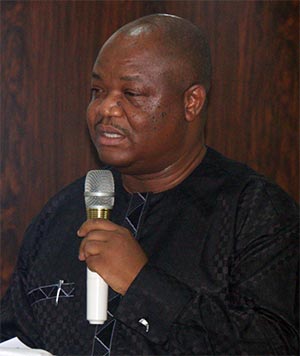
In his preliminary discussion, the Coordinator of the retreat and one of the resource persons, Prof. Sola Akinrinade who was the former and pioneer Vice-Chancellor of Osun State University Osogbo, explained that people fail because they lack skills, adding that the purpose of the programme was to help in developing the next generation of institutional leaders. He, therefore, highlighted some topical issues which would be the focal points in different sessions at the event. These according to him included leadership and mentoring skills, management skills, team-building, delegation and supervision skills, communication skills, counselling skills, as well as the need for accountability and integrity in leadership.
Prof. Akinrinade in his first presentation entitled: Leadership: A Paradigm Shift emphasised that leaders are not infallible beings, and therefore, a good leader is expected to admit his/her weaknesses and work hard to ameliorate them. In his reference to Stone 1995, Prof. Akinrinade explained that a good leader must, Plan Change, React to Change, Initiate Change, and Institutionalise Change. While explaining that the concept of 3600 leaders is attributable to those that distinguished themselves in leading up (leading senior colleagues), leading across (leading colleagues), and leading down (leading Junior colleagues), the facilitator identified three types of leadership which included Transformational, Servant, and Authentic leaders. He added that every category of leadership, especially those that lead up, must be able to manage well, his/her emotions, time, priorities, energy, thinking, words and personal life.
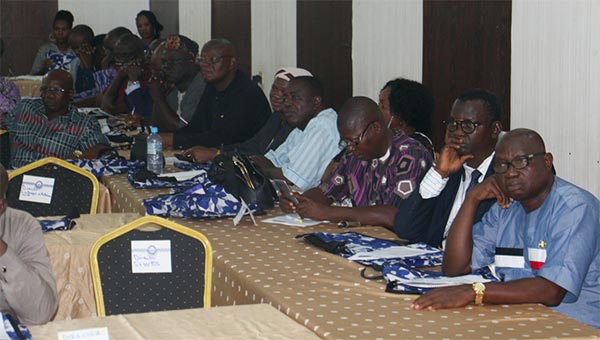
In a related development, Prof. Wale Akinsola, an Emeritus Professor of Medicine and former Deputy Vice-Chancellor, Obafemi Awolowo University Ile-Ife, who presented another impactful paper, entitled: Team Work: A Powerful Strategy for Effective and Purpose-Driven Management, stated that team-work as a concept is a new phenomenon. He defined a team as a small number of individuals with complementary skills who collaborate on a project and are committed to a common purpose and shared goals, He added that the individuals who must be flexible, innovative and creative are jointly accountable for performing tasks that contribute to achieving an organisation’s goals. While stressing that team processes, performance, preparation for the future, satisfaction of individual members were the key issues in team effectiveness, Prof. Akinsola highlighted cohesiveness, trust, decision-making, innovation, speed cost, ability to adapt to change, satisfaction with team process, team members’ and personal development as the derivatives of team effectiveness.
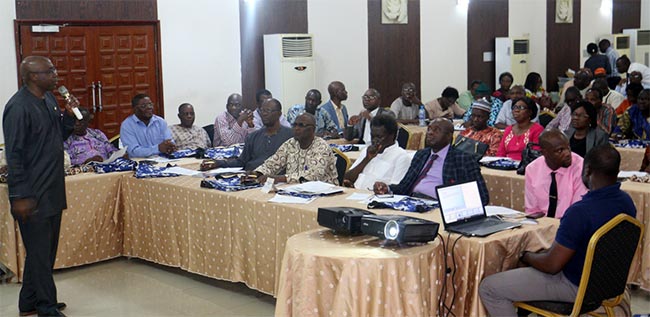
While emphasising that leadership and followership are two stringed phenomena which cannot be discussed in isolation, the former Vice-Chancellor of University of Lagos, Prof. Oye Ibidapo-Obe in another presentation entitled: Leading A 21st Century Nigerian University expressed the need for different types of aptitudes if the University must be well-managed and therefore, urged leaders to always take cognizance of the followership as individuality would be totally lost in the next century. While acknowledging that Innovations and inventions based on research were the key purpose for the establishment of any University, Prof. Obe noted that ICT would play key roles in University administration and management in the 21st century as obviously exemplified in the Open and Distance Learning (ODL) and Massive Open Online Course (MOOC) which are expanders of accessibility to University education.
To survive the emerging trend in the 21st century University education, the facilitator opined that “University leaders must be proactive in its action plan. For instance, there will be the need for Universities to change their fundamental morphology to survive the rapidity of digitalisation, as the social media will influence greatly, the morphology of the University of the future e.g. the ‘Wiki’ ‘You Tube’, ‘My Space’ and so on”. He added that the University leaders should prepare for a change in pedagogy, where methodology involves student participation the more, intelligently show interest in the activities of Unions in the University, and ensure staff residency as very important considerations in achieving a 21st-Century University.
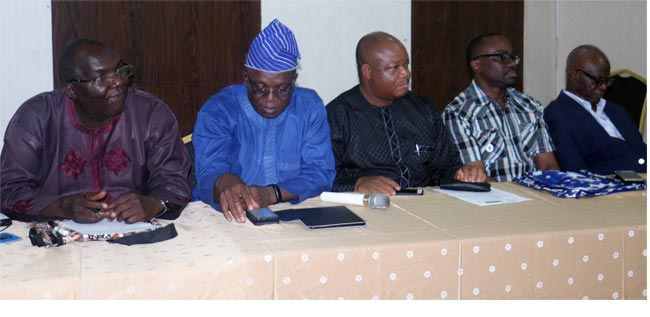
In another presentation, entitled: Mentoring: A Critical Factor for Sustainable Growth and Development for an Organisation, Emeritus Prof. Wale Akinsola reiterated the need for a structured mentoring programme to bring about a change in the practice and delivery of service and continuous professional development through life-long learning. Viewed as a sine qua non for an academic community, he explained mentoring as a complex interactive process occurring between individuals of differing levels of experience and expertise which incorporates interpersonal or psychosocial development and socialisation into the relationship. He concluded that the act of mentoring usually involve a mentor who is expected to be an established and seasoned academic offering opportunities to develop and also helping to maintain professional experience on the one hand, and a mentee on the other, who can be a new recruit, a newly promoted person or a person assuming new roles, and must be career-oriented rather than a job-oriented person, who must be willing to invest in time and effort.
On Effective delegation and Supervision, Prof. Sola Akinrinade stated that delegation is an assignment of a duty which ordinarily is that of the person delegating to another person who is equally capable of carrying them out and it must be predicated upon capability and supervision. He submitted that while the benefits of delegation to the subordinate included opportunities for learning and development, a platform for demonstrating competency and capacities, contributions from all, among others, it is also of numerous benefits to the organisation as it promotes greater efficiency, opportunities for all to contribute to the growth of the organisation, and expanded number of skilled personnel.
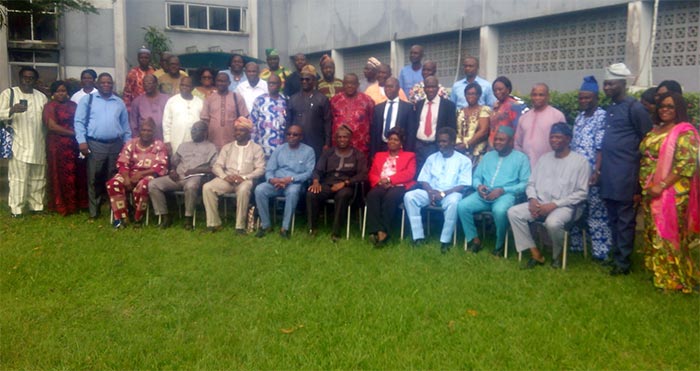
In one of her presentations entitled: COUNSELLING THE 21ST CENTURY STUDENT, the former Vice-Chancellor, Tai Solarin University of Education (TASUED), Ijagun, Ijebu-Ode, Prof. Oluyemisi Obilade stressed that the 21st Century had come with lots of distinctions from the previous centuries. This, she said “was responsible for the unique nature of the 21st century students in so many ways as obvious in their high level of exposure and susceptibility to the influences of people whose real presence they may never witnessed”. She added that the situation called for adequate guidance and proper counselling, owing to the attendant exigencies of academic challenges, learning styles, examination malpractices, drug abuse and addictions, and cyber-crimes.
While explaining that counselling is a one-on-one process meant to untangle the troubled mind of the counselee (person being counselled) in order to provide a pathway forward, Prof. Mrs. Obilade observed that guidance services are for all, voluntary and not by force or coercion. They are also for all school levels, and are aimed primarily at preventing problems than solving them among others, and therefore constitute some principles of guidance and counselling. She, however, submitted that in promoting guidance and counselling services in the University, the capacity of the school counsellor must be updated through training and re-training, a youth-friendly environment must be put in place for counselling services, current processes, procedures and approaches must be adopted, while friendly expressions must be adopted. Prof. Obilade concluded that the counsellor must also possess some quality traits to facilitate effective counselling sessions like being informal and approachable, keeping an open mind and avoid being judgmental among others, while also affording some moments of emotional outlets during the counselling session.
Concluding the retreat session with the presentation entitled: Designing An Ethical Code For OOU, Prof Sola Akinrinade highlighted the basis of the session, one of which was to deepen delegates’ capacity to improve and sustain University ethics and the need to imbibe the ethical code. He explained that ethical codes can help organisations to protect their reputation and change an over-aching integrity management system. He advised that to sustain it, ethical principles must be incorporated into induction programmes, emphasised as part of personal daily practice and embedded in the institution’s culture. He concluded that adequate reporting mechanism (e.g. whistle-blowing) and disciplinary mechanisms must be put in place, roles must be allocated, while ensuring that periodical review of the code is done.
At the end of the retreat, participants, having been taken through nine different sessions as revealed above, took turn to appreciate and commend the University Management under the able leadership of Prof. Ganiyu Olatunji Olatunde not only for the brilliant initiative, but also for the wonderful experience, including their welfare throughout the programme. This, they revealed, surpassed their individual expectation and, therefore, would continue to serve as guide in the discharge of their duties in line with the Management resolve at attaining the status of 21st Century citadel of learning. They, however, appealed to the University authorities to sustain this unprecedented gesture by ensuring that the retreat became a regular affair.

